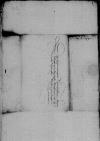List #4373
Ioannes DANTISCUS do Gdańsk Town CouncilHeilsberg (Lidzbark), 1540-04-29
| odebrano Gdańsk (Danzig), 1540-05-01 Rękopiśmienne podstawy źródłowe:
| ||||
Tekst + aparat krytyczny + komentarz Zwykły tekst Tekst + komentarz Tekst + aparat krytyczny
Den ersamen und namhafftigen herren burgermeister und rathman der ko(nigliche)n stadt Dantzke, unsern gunstigenn freundenn.
Unsern freuntlichen grus und alles gutten zuvoran. Ersame, namhafftige herren, gunstige freunde.
Wir haben E(wer) E(rbarkei)t cf.
Dat(um) aus unserm schlos


 APG 300, 53, 267, p. 102
APG 300, 53, 267, p. 102